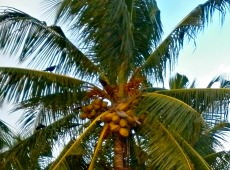Last night group of masked men broke into Thakandhoo School in Haa Alif atoll after threatening the security guard with a knife in order to cut down what they claimed was a ‘Jinn Tree’ with evil spirits.
Thakandhoo Island Council Vice President Ibrahim Saeed said the incident happened around 3am this morning.
“Three masked men jumped over the school wall last night and one of them threatened the security guard with a knife. And while he held the security guard, the other two went in with a hand saw and cut down the tree,” he said.
The Maldives Police Service confirmed that the incident is currently under investigation and that a police team from Ihavandhoo arrived on the island within an hour of the incident.
Local media outlet CNM has reported that the tree is approximately 13 years old and was planted by the school staff.
“It was a beautiful tree planted to give a good look to the school compound. Sometimes students try to climb it, and last year three students were possessed by Jinns,” CNM was told by the school staff member.
“People say it is because of that tree, so we even brought five people to look into the matter. But even they didn’t recommend to cut down the tree.”
CNM also quoted the staff member as saying that the Jinns [of the tree] had already “stabilised” when it was cut down last night.
Fanditha politics
Speaking to Minivan News, a local who supported the cutting down of the tree said that many believed the tree was connected to the jinn possession of children last year.
“Thing went really bad last December,” explained the local man. “Many of those children have recovered now but there is a child who is still possessed. And there is young girl who loses consciousness whenever she walks past by this tree.”
“Even when things are like this, the island is so politically divided that these issues are politicised and an agreement is not reached as to how it should be dealt with.”
He said the rivalry between two group of islanders dates back to the pre-democracy era and that issues have further polarised with party politics.
“Fanditha practice is very common here. The island is divided into two rival groups even before party politics.”
“But now it [the divide] is [politically] colored, and represented by supporters of PPM [ruling Progressive Party of Maldives] aligned with the former island chief’s family and friends, and those supporting MDP [opposition Maldivian Democratic Party]. There are magicians on both sides,” he explained.
Last September a group of ‘Islamic exorcists’ uncovered ‘hexed clay tablets’ buried near the school compound following a series of ‘jinn possession’ incidents. A police team went to the island with a court warrant and searched all the houses for black magicians and traditional fanditha magic related objects.
The incident, which took place as the whole country was preparing for the second (cancelled) round of presidential election, left the island community in shock and fear.
MDP supporters from the island claimed it was a political plot to frame their members for practicing black magic as reports of black magic emerged across the country during the 2013 election period.
Practice of black magic is a criminal offense under Shariah Law, which it is punishable by death – a sentence still handed down for the offence in countries like Saudi Arabia.
In 1953 local black magician Hakim Didi was sentenced to death in the Maldives for practicing magic which eventually lead to the murder of an atoll chief by poisoning and use of black magic in a plot to kill President Mohamed Ameen Didi.
Along with a group of magicians and other co-conspirators, Hakeem Didi is said to have confessed to carrying out many disturbing black magic practices. These include the brewing of a magic poisonous fish potion, the extraction of liver oil from corpses of children, and eating them along with flour dough effigies of the president.
Didi was executed by a firing squad, after which there has been an unofficial moratorium on death penalty in the Maldives.
The permitted forms of white fanditha magic are also regulated by the government and can be legally practiced only with a written permission from the Ministry of Health according to the Traditional Medicine, Fanditha (Magic), Circumcision and Midwifery Services Act of 1978.

 “She thought MDP had cast the black magic spells because the coconuts were yellow,’’ the island council source explained. “Once Moosa found out what his wife had done, he told her it was very bad that she had reported it to police.’’
“She thought MDP had cast the black magic spells because the coconuts were yellow,’’ the island council source explained. “Once Moosa found out what his wife had done, he told her it was very bad that she had reported it to police.’’